Publications
For submission of articles or Working Papers to CEsA, please send an email to:
comunicacao@cesa.iseg.ulisboa.pt
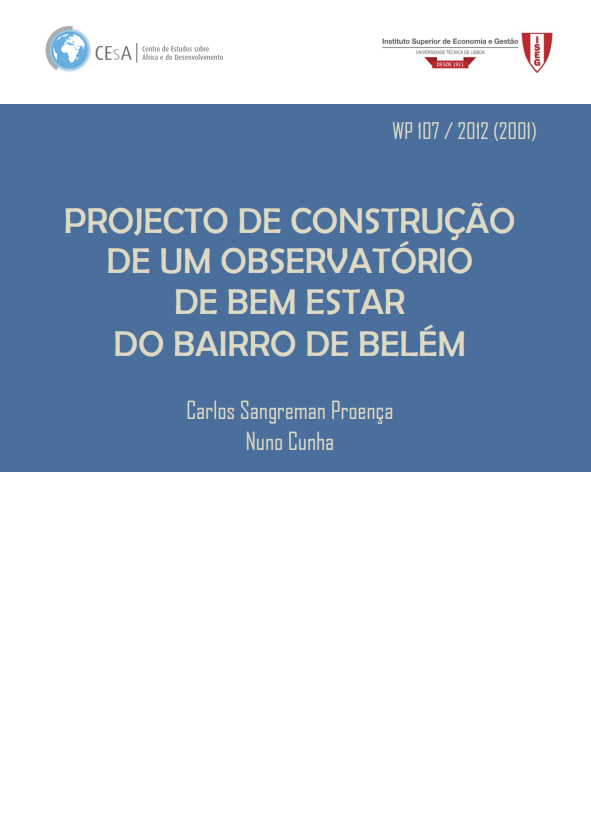
Working Paper 107/2012: Projecto de construção de um observatório de bem estar do bairro de Belém
Resumo:
In Projecto de construção de um observatório de bem estar do bairro de Belém we take this idea of “satisfaction” as a basis for defining the concept of well-being. In a society like the African one where the relationship with others is an important value, this idea is always applied considering the individual dimension articulated with the social group dimension. This concept has the consequence that the well-being of an individual cannot be understood without the family, and without the social groups with which its members identify. It is the articulation of these different social groups that defines the level of well-being of a collective, whether it is an ethnic group, a neighborhood or the whole national. in the neighborhoods there is a theoretical framework that starts from the idea that it is fundamental to determine what would happen if there had not been concrete actions to improve the well-being. Returning the results of surveys to respondents is an important element in the work done in a neighborhood, and in creating a sense of usefulness in the responses that the population gives to surveyors, whether in the current survey or in the future.
Citação:
Sangreman, Carlos e Nuno Cunha. 2012. “Projecto de construção de um observatório de bem estar do bairro de Belém”. Instituto Superior de Economia e Gestão . CEsA –Documentos de Trabalho nº 107/2012.
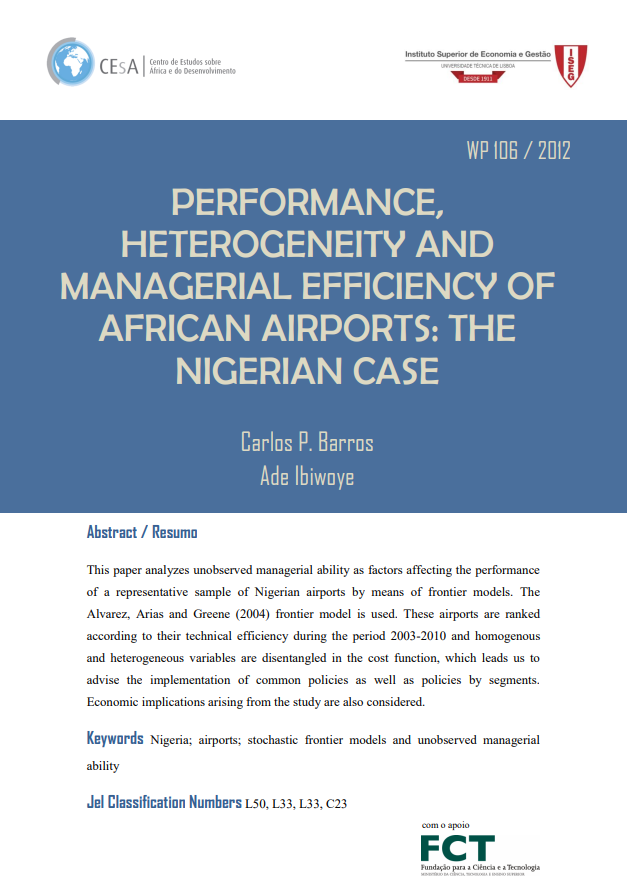
Working Paper 106/2012: Performance, heterogeneity and managerial efficiency of African airports: the Nigerian case
Abstract:
The analysis of airport efficiency can yield significant insights into the competitiveness of airports and their potential for increasing productivity and improving resource use. The research on airports has adopted DEA models or homogenous production frontier models. Performance, heterogeneity and managerial efficiency of African airports: the Nigerian case innovates in this context, by analyzing a sample of Nigerian airports with the Alvarez et al. (2004) model and the cost frontier model. Therefore, this paper innovates in the airports context by going beyond DEA models and homogenous production frontier models adopting the Alvarez, Arias and Greene (2004) frontier model which enables to measure managerial effects on the frontier cost framework. This paper analyzes unobserved managerial ability as factors affecting the performance of a representative sample of Nigerian airports by means of frontier models. These airports are ranked according to their technical efficiency during the period 2003-2010 and homogenous and heterogeneous variables are disentangled in the cost function, which leads us to advise the implementation of common policies as well as policies by segments. Economic implications arising from the study are also considered.
Quotation:
Barros, Carlos Pestana e Ade Ibiwoye. 2012. “Performance, heterogeneity and managerial efficiency of African airports: the Nigerian case”. Instituto Superior de Economia e Gestão. CEsA – Documentos de Trabalho nº 106/2012.
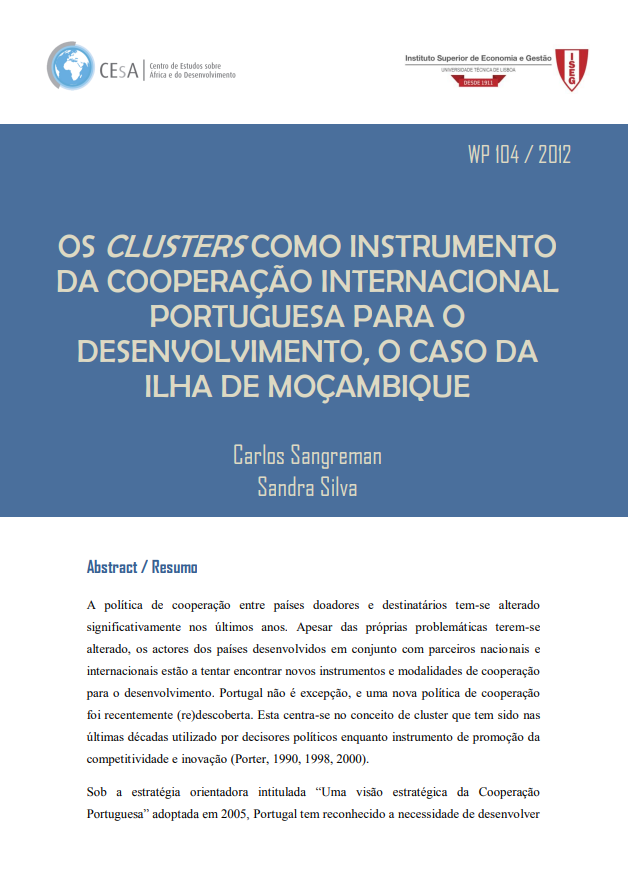
Working Paper 104/2012: Os clusters como instrumento da cooperação internacional portuguesa para o desenvolvimento, o caso da Ilha de Moçambique
Abstract:
The cooperation policy between donor and recipient countries has changed significantly in recent years. Despite the problems themselves having changed, actors from developed countries together with national and international partners are trying to find new instruments and modalities of cooperation for development. Portugal is no exception, and a new cooperation policy was recently (re)discovered. This focuses on the cluster concept that has been used in recent decades by policy makers as an instrument to promote competitiveness and innovation (Porter, 1990, 1998, 2000). Under the guiding strategy entitled “A strategic vision of Portuguese Cooperation” adopted in 2005, Portugal has recognized the need to make efforts to adopt this new instrument. This “consists of a number of projects that are implemented by different institutions, in the same geographic area and within a common framework” (IPAD, 2005: 52). Within this scenario, Os clusters como instrumento da cooperação internacional portuguesa para o desenvolvimento, o caso da Ilha de Moçambique focuses on the Portuguese case, as a potential case to try to understand the potential as an innovation and the political coherence of the objectives and strategies underlying the creation of cooperation clusters. Thus, it is intended to account for the ongoing research not only from a perspective of (re)examining the theoretical arguments for the adoption of clusters, but also through an analysis of the current practices of cooperation with Mozambique.
Quotation:
Sangreman, Carlos e Sandra Silva. 2012. “Os clusters como instrumento da cooperação internacional portuguesa para o desenvolvimento, o caso da Ilha de Moçambique”. Instituto Superior de Economia e Gestão. CEsA – Documentos de Trabalho nº 104/2012.
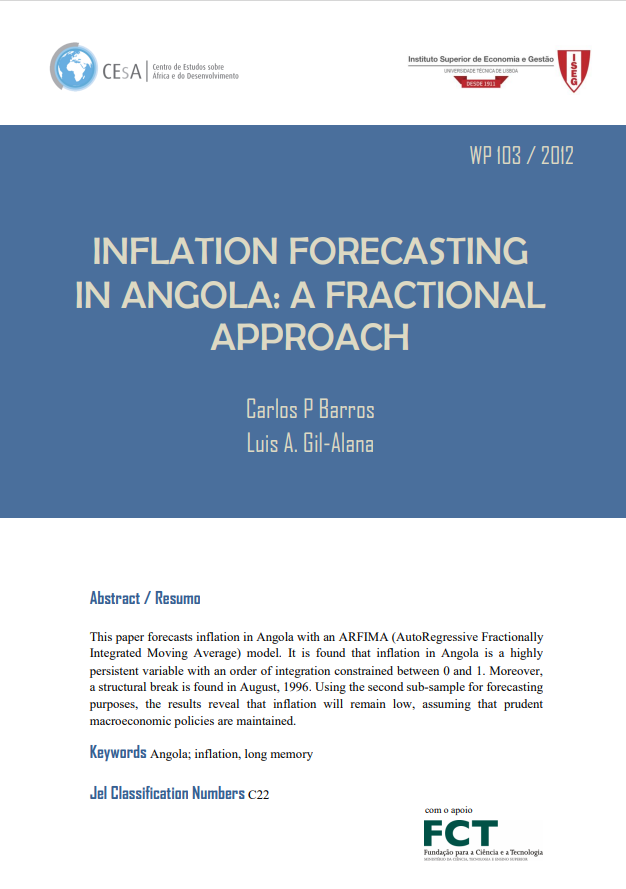
Working Paper 103/2012: Inflation forecasting in Angola: a fractional approach
Abstract:
Forecasting is a way to evaluate price evolution and therefore it is a macroeconomic management tool. There is a well-established tradition of research on price forecasting. This study analyses price forecasting in Angola using long memory techniques and ARFIMA (AutoRegressive Fractionally Integrated Moving Average) models. These models are an accepted reference in forecasting and are used extensively, due to the fact that they interpret the data with accuracy. ARIMA models are found to dominate alternative approaches. However, Doornik and Ooms (2004) found that the fractional ARIMA (ARFIMA) model better describes the inflation dynamics than non-fractional ARIMA models based on integer degrees of differentiation. Since then, inflation series have been examined in many countries by means of fractionally integrated or I(d) models. Inflation forecasting in Angola: a fractional approach applies an ARFIMA model for the first time to price forecasting in relation to the economy of Angola. The models are estimated using monthly data from 1991:1 to 2011:6. Inflation forecasts based on ARFIMA models suggest that inflationary pressures for the period 2011:7 to 2012:12 are expected to be relatively low.
Quotation:
Barros, Carlos Pestana e Luis A. Gil-Alana. 2012. “Inflation forecasting in Angola: a fractional approach”. Instituto Superior de Economia e Gestão. CEsA – Documentos de Trabalho nº 103/2012.
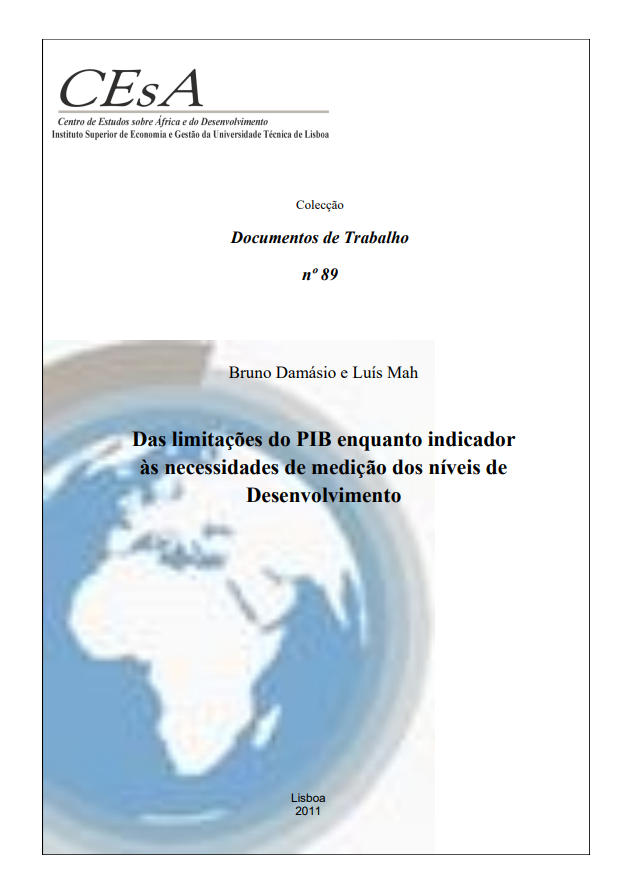
Working Paper 101/2012: Das limitações do PIB enquanto indicador às necessidades de medição dos níveis de desenvolvimento
Abstract:
Using as valid the definition of economy the allocation of scarce resources to unlimited needs, we arrive at a conception of economic policy as the action of public authorities in economic domains aimed at obtaining previously chosen results (Amaral, 1996). It is interesting, then, to reflect on the fact that, without the construction of statistical instruments and indicators that allow us to assess the consequences and interpret the results deriving from political action, it will be difficult to provide consistent guidance for economic policy-making. It is in this context that we start our essay with a meditation on the possible weakness of the economic activity indicator most used by mainstream economists and politicians. Das limitações do PIB enquanto indicador às necessidades de medição dos níveis de desenvolvimento seeks to problematise some limitations and insufficiencies of the traditional tools for measuring the economic performance and development of states, such as the Gross Domestic Product (GDP). A brief comment is made on some indices which, with various scopes, attempt to complement this measure. The need to consolidate and stimulate the improvement of alternative indicators and measures is highlighted, so as to reduce the existing deficiencies in the current measurements of development that serve as reference.
Quotation:
Damásio, Bruno e Luís Mah. 2011. “Das limitações do PIB enquanto indicador às necessidades de medição dos níveis de desenvolvimento”. Instituto Superior de Economia e Gestão. CEsA – Documentos de Trabalho nº 89/2011.
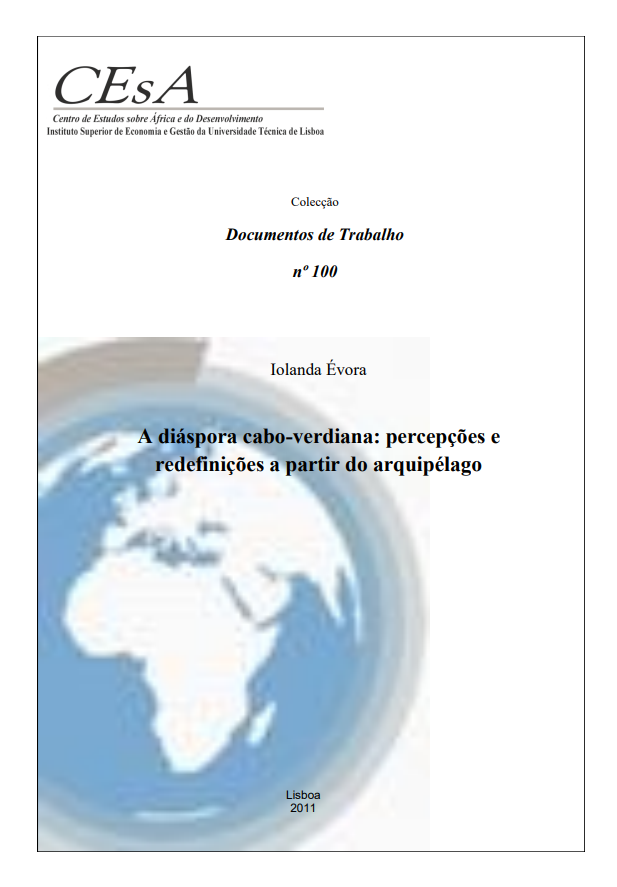
Working Paper 100/2012: A diáspora cabo-verdiana: percepções e redefinições a partir do arquipélago
Abstract:
A diáspora cabo-verdiana: percepções e redefinições a partir do arquipélago analyzes the role that Cape Verde plays in the context of diasporic society, understanding that what we call here as a showcase function is attributed to it, or which stamps the certification of productions carried out in the space of the diasporic community. Not only does the archipelago seem condemned to seek its sources in its universe of emigration, but it also proves to be a favorable place as a source of the schemes by which the emigration experience is organized and reported by those who left, as society adapts to the conditions offered in the different historical periods of migration, to the setbacks or expansions of the migratory process, over time. In other words, Cape Verdean emigration will not be the same, not only because conditions abroad have changed but also because the society of origin has changed and has changed in relation to their emigration, which refers to the unique place they can have within the Cape Verdean diasporic society. The local community is constantly alert and listening to this part of itself that is separate from it, adapts its rhythms to the news, to the returns that occur on periodic dates and lives as if suspended, waiting for expressions that come from outside. At the same time, the reciprocity established between these two poles is better drawn, with Cape Verde redefining its role as a place of origin, now serving as the center of the syntheses of what the diaspora produces, at the same time that, through its hybridity, allows emigrants abroad to offer their nationality as an important business card.
Quotation:
Évora, Iolanda. 2012. “A diáspora cabo-verdiana: percepções e redefinições a partir do arquipélago”. Instituto Superior de Economia e Gestão. CEsA – Documentos de Trabalho nº 100/ 2012.
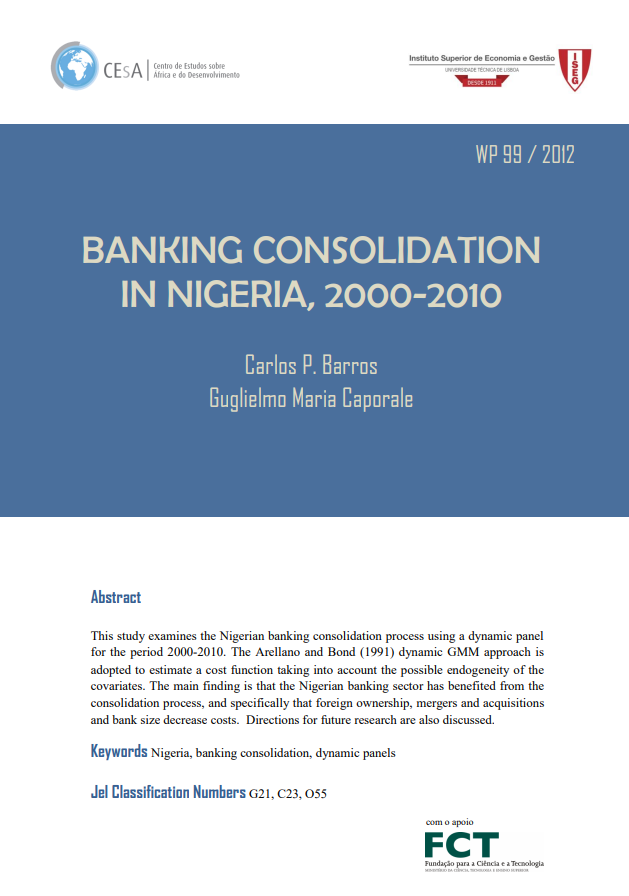
Working Paper 99/2012: Banking consolidation in Nigeria 2000-2010
Abstract:
Banking consolidation in Nigeria 2000-2010 focuses on the impact of banking consolidation in Nigeria on costs of banks during the period 2000-2010. This process started in 2004 after the Central Bank of Nigeria (CBN) announced new capital requirements for Nigerian banks. The intention was to push banks to increase their average size through mergers and acquisitions. Some banks could neither satisfy the new capital requirements nor find a suitable merger partner, and therefore were forced to go into liquidation. As a result, the number of banks was considerably reduced. Not surprisingly, all foreign banks survived the recapitalisation as they usually relied on capital injections from the parent company to meet the capital requirements. The total number of Nigerian banks immediately after the consolidation, that is, before the Stanbic Bank/IBTC merger, was 25. The present study makes a threefold contribution. First, it provides evidence on the impact of consolidation on costs in the specific case of Nigerian banks, as this can vary from country to country, depending on their market characteristics and regulations . Second, it adds to the limited number of existing studies on banking consolidation by estimating a more suitable dynamic model rather than conducting the efficiency analysis typical of most papers. In particular, it adopts the dynamic GMM method. Third, it focuses on Africa, a region which has attracted only limited attention in the literature, most studies examining instead European or US banks.
Quotation:
Barros, Carlos Pestana e Guglielmo M. Caporale. 2012. “Banking consolidation in Nigeria 2000-2010”. Instituto Superior de Economia e Gestão. CEsA – Documentos de Trabalho nº 99/2012.
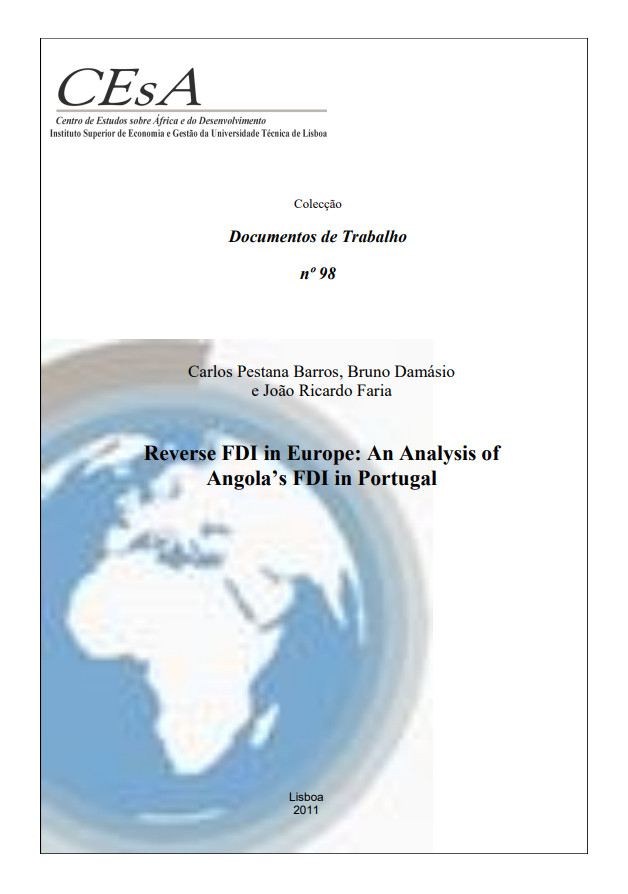
Working Paper 98/2011: Reverse FDI in Europe: an analysis of Angola’s FDI in Portugal
Abstract:
The literature on Foreign Direct Investment (FDI) is large and wide and has examined a number of diverse issues. Among them, to list a few, is the domestic capital stock, the economic growth, the employment protection, the exports, the knowledge capital, the location choice, multinational characteristics, productivity spillovers, the total factor productivity, and technology transfer. This text contributes to the literature by examining Angola’s FDI in Portugal. This is a new topic in the literature, since most studies focus on FDI flows from developed ountries to poor countries, either adopting a micro approach with company data or adopting a macro approach with national data. However, the analysis of FDI from former colonial African countries in the former colonial European ruler has not attracted attention so far. An open economy model with money laundering is proposed and then tested with a time series Bayesian regression. The result reveals that exports and corruption are the positive determinants of Angola FDI in Portugal. Policy implications are derived.
Quotation:
Barros, Carlos Pestana. Bruno Damásio e João Ricardo Faria. 2011. “Reverse FDI in Europe: an analysis of Angola’s FDI in Portugal”. Instituto Superior de Economia e Gestão. CEsA – Documentos de Trabalho nº 98/2011.
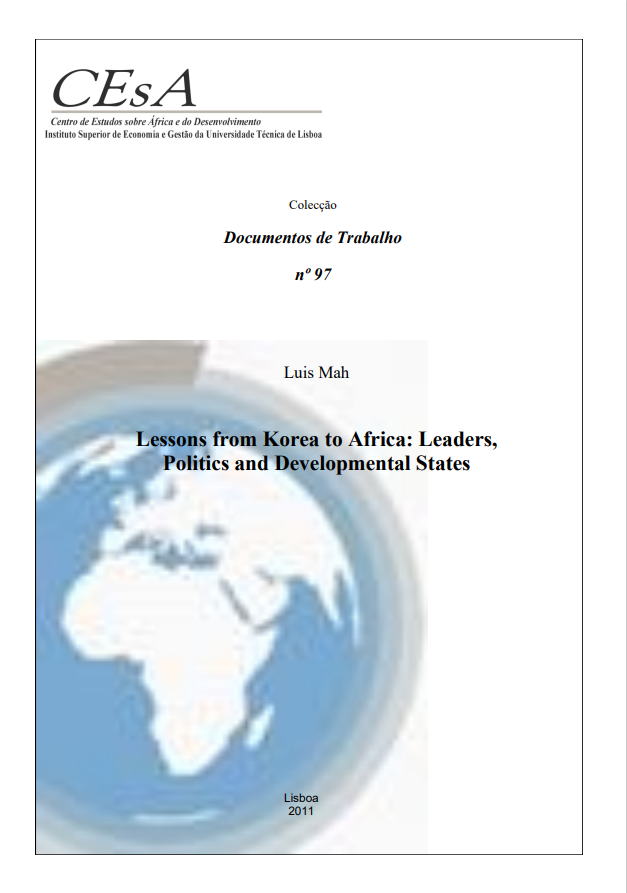
Working Paper 97/2011: Lessons from Korea to Africa: leaders, politics and developmental states
Abstract:
A recent series of studies have been dealing with the dynamics behind the building of developmental states in Africa. Lessons from Korea to Africa: leaders, politics and developmental states is a contribution for that debate by looking at the experience of the Korean developmental state and the lessons that Africa can learn from this Asian country’s experience seen as an outstanding model of economic development. Despite poor resource endowment and a large population, a colonial legacy, the devastation following a civil war, persistent political instability, and the lingering military confrontation with her northern neighbour, Korea’s role in the international economic system has rapidly increased in importance since the 1960s. For nearly five decades, Korea has achieved a remarkable economic performance that transformed the country from a typical case of a developing nation trapped in a “vicious circle of underdevelopment”, into one of the largest economies in the late 1990s. Beneath the economic success lied a system of “socialisation of private risk”, a particular mode of organising the market, as the “visible hand” of a strong, bureaucratic and developmental state were able to accelerate the pace of economic growth by identifying strategic industrial sectors, making discretionary allocation of resources to those sectors, and minimising the collective action dilemmas pervasive in most developing countries. But the Korean state, as any other state, is a political realm that encompasses distinct, contending and at times colliding actors. In fact, the Korean developmental state provides us clues about the role that leadership play and what stands at the “heart of a politics of economic growth”. Policy choices and implementation rest on the strategies designed by the rulers to boost their political legitimacy, to strengthen their power, and to guarantee regime survival. Strategies are not only a product of institutional opportunities and constraints, but also of history, context, coalition politics and ideological templates involving the actors at the time of action. This paper will discuss the role played by President Park Chung-Hee (1961-1979) in building a bureaucratic-developmental state and what African countries can learn from these leadership experiences in terms of its own development path.
Quotation:
Mah, Luís. 2011. “Lessons from Korea to Africa: leaders, politics and developmental states”. Instituto Superior de Economia e Gestão. CEsA – Documentos de Trabalho nº 97/2011.
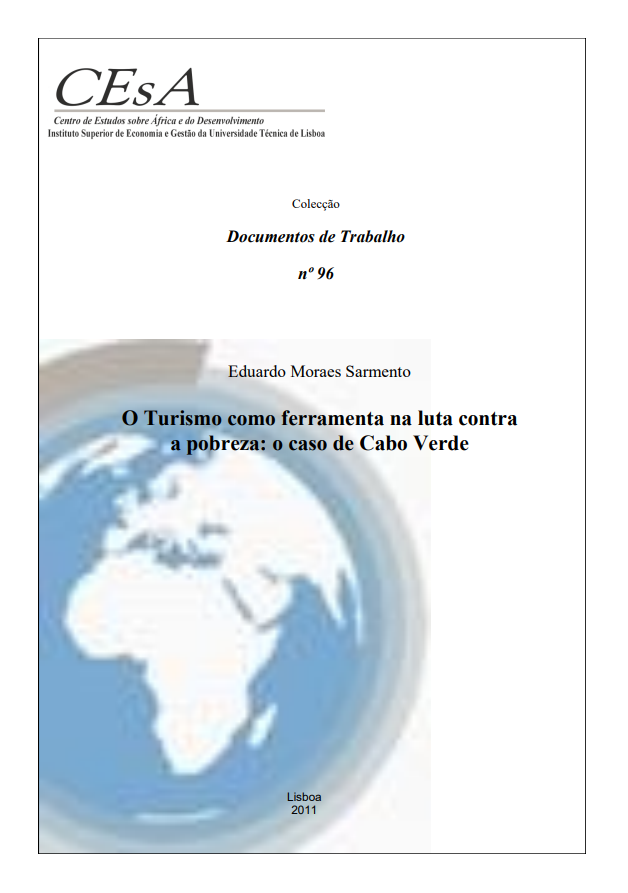
Working Paper 96/2011: O turismo como ferramenta na luta contra a pobreza: o caso de Cabo Verde
Abstract:
The poverty line necessarily varies from country to country. In some regions of the world, well-being is attained when the amount of food and clothing is sufficient for full social integration. However, in more industrialised societies, the level of demand will be higher. Thus, in some cases, it may be concluded that integration will depend on the culture, the region and even the period that is being experienced (Sen, 1983), it being certain that this phenomenon will cease to be local and become global as a corollary of the globalisation process. In this context, it is important to stress that any approach taken will always be subjective in nature and it will always be very difficult to adequately characterise which goods and services are really fundamental in order to stipulate a certain level of poverty, exclusion or even deprivation. This article aims to reflect on the drama that plagues many of today’s societies: poverty. This is a phenomenon which must be eradicated quickly. O turismo como ferramenta na luta contra a pobreza: o caso de Cabo Verde intends to reflect on the drama that plagues many of today’s societies: poverty. This is a phenomenon that needs to be eradicated quickly. The article has two main parts. In a first phase, its causes and the different forms of manifestation are analyzed. In a second phase, we intend to analyze in more detail how tourism can be used as an alternative way to reverse or minimize this calamity.
Quotation:
Sarmento, Eduardo Moraes. 2011. “O turismo como ferramenta na luta contra a pobreza: o caso de Cabo Verde”. Instituto Superior de Economia e Gestão. CEsA – Documentos de Trabalho nº 96/2011.





